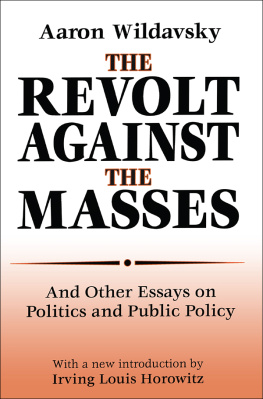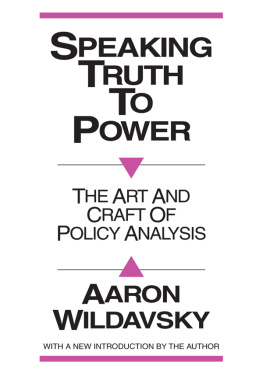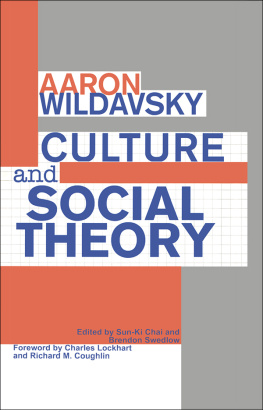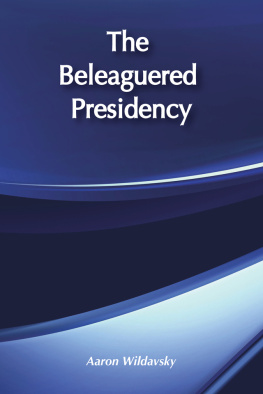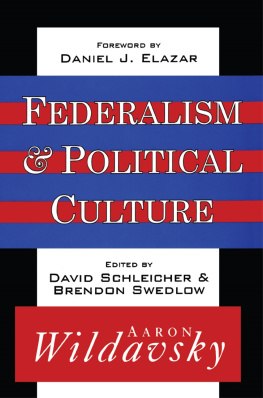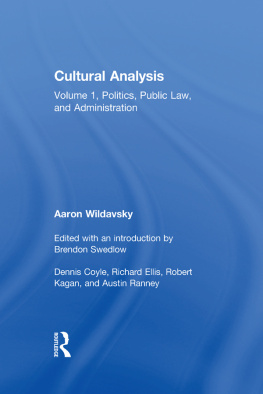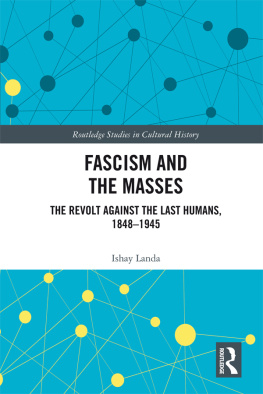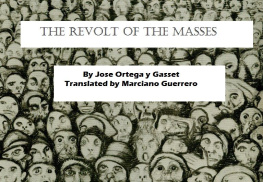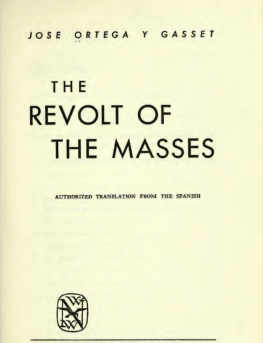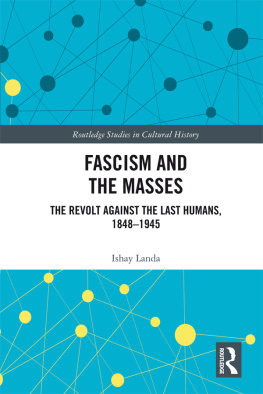Originally published in 1971 by Basic Books, Inc.
Published 2003 by Transaction Publishers
Published 2017 by Routledge
2 Park Square, Milton Park, Abingdon, Oxon OX14 4RN
711 Third Avenue, New York, NY 10017, USA
Routledge is an imprint of the Taylor & Francis Group, an informa business
New material this edition copyright 2003 by Taylor & Francis.
All rights reserved. No part of this book may be reprinted or reproduced or utilised in any form or by any electronic, mechanical, or other means, now known or hereafter invented, including photocopying and recording, or in any information storage or retrieval system, without permission in writing from the publishers.
Notice:
Product or corporate names may be trademarks or registered trademarks, and are used only for identification and explanation without intent to infringe.
Library of Congress Catalog Number: 2002074325
Library of Congress Cataloging-in-Publication Data
Wildavsky, Aaron B.
The revolt against the masses and other essays on politics and public policy
/ by Aaron Wildavsky ; with a new introduction by Irving Louis Horowitz.
p. cm.
Originally published: New York: Basic Books, 1971.
Includes bibliographical references and index.
ISBN 0-7658-0960-5 (paper : alk. paper)
1. United StatesPolitics and government1945-1989. I. Title.
JK271 .W545 2002
320.973dc21
2002074325
ISBN 13: 978-0-7658-0960-5 (pbk)
to the memory of
Samuel J. Konefsky
and
Jacobus tenBroek
They shared indomitable will,
moral character, genius in teaching,
extraordinary accomplishment
in research.
Both men were blind. They gave me sight.
FACTS, POLICIES, MORALS: THE FREE SPIRIT OF AARON WILDAVSKY
I
I have been an admirer of Aaron Wildavsky for so long that when he died nearly a decade ago, I felt a personal injurysomething akin to losing a limb. Just who would take up leadership of the intellectual defense of the common culture? I am surely not the only person to ask such an admittedly rhetorical question. He gave backbone to so many people in public life and in academic pursuits, that the problem of Aaron not being among us was less the quality of his legacyalready assuredbut the character of the remaining living. It was somehow always easier to be courageous knowing Aaron was in your corner. How would we fare with him gone? If this appears a strange way to open the new edition of The Revolt Against the Masses, it will, nonetheless, have to suffice. I hope that by the close of my remarks, the source of my personal concerns will be evident.
As The Revolt Against the Masses makes plain, Aaron compelled us to think in multiple tracks. He always asked first, what are the facts in any given situation?whether it is the nature of presidential leadership in foreign affairs or political determinants of economic decisions. Second, he asked, what are the policy implications of any serious analysis? Since, in every major empirical study, the author drives and the reader is taken for a ride in the fact lane, what are we to do about the affairs described? Third, Aaron compels us in nearly every essay to answer the moral call: what are the human consequences of events and then of policies? Like Herbert Croly, who started the century before him, what haunted Aaron Wildavsky was the unrealized promise of American life at the close of the twentieth century. In that phrase lies the moral goodness of a people still in search of its ethical moorings.
If there is a secret in Aarons style of work, and I suspect that he would be properly dismissive of any sort of mystical turn to that phrase, it is a methodology that eases into a morality mediated by a policy. In my capacity as editorial director at Transaction, I have supervised the publication or the republication of no fewer than twelve of Aarons titles in just about every field in which he workedfrom public budgeting to the nature of representational politics. With the guidance of a variety of his former students and colleagues, we have also turned out five posthumous volumes of Aarons papersand have done so at considerable personal cost to people who put aside their own labors to complete the task. Aaron is worth it. For those with little time to spare and who are new to the wonders of Aaron, I would suggest two bookspublished while he was very much alive and with us: Speaking Truth to Power, and now, The Revolt Against the Masses. These texts, available in new editions from Transaction, will make one either a convert to, or a critic of, Aaron. He would not mind either outcome. He never lacked for good friends, but he never shrank from a good fight. Opponents no less than allies define who are and where we stand. This Aaron well knew.
II
Aarons play of words on Jos Ortega y Gassets The Revolt of the Masses should not be taken as more than that. His concerns in The Revolt Against the Masses are not the emergence of mass repudiation of inherited elitist notions of domination and power, and certainly not with the dangers in the accession of the masses to social power. Rather, Aarons intuition is to show how elites have struggled within themselves to maintain their domination and power. Far from being a source of humanistic tradition as Ortega held, the new elites are a source of anti-populist efforts to re-divide the wealth. In these ideas, Wildavsky is largely indebted to the Franco-Italian tradition in political sociologyespecially Gaetano Mosca, Roberto Michels, and Vilfredo Pareto, rather than to the tradition of Spanish humanistic education. He makes the intent of this volume, its organizing principle, quite clear early on, in the essay that bears the title of the book.
The revolutionaries of contemporary America do not seek to redistribute privilege from those who have it to those who do not. These radicals wish to arrange a transfer of power from those elites who now exercise it to another elite, namely themselves, who do not. This aspiring elite is of the same race (white), the same class (upper middle and upper), and the same educational background (the best colleges and universities) as those they wish to displace. The goal of this white, radical, privileged elite is clear: a society purged by them of the values, tastes, preferences and policies desired by the mass of Americans. The white elite is in revolt against the masses. The incendiary character of this opening gambit is not accidental, but part of a deeply held conviction by Wildavsky that the masses in America represent the source of the democratic tradition. At one fell swoop, Aaron undercuts the idea of a conservative or restorationist biasand affirms a deep suspicion of radical ideologies as the answer to that which needs curing.
Wildavskys deep fear, fueled in large part by the Vietnam War, was the raw capacity of elites to undercut the survival of national legitimacy as such. Ways of life are in contention; that is why our image of America as a single nation, indivisible, is shaken. In truth, the thirty years that have passed since Aarons writing of this essay indicate that he was correct about breaks in the national fabricits sources in a war that was poorly definedand in his belief that the masses were the source of whatever cohesion and integration that existed. Arguably, it was not until the terror bombings of the World Trade Center and the Pentagon in September 2001 that the sense of urgency in regaining an integrated approach was realized. When the nation was perceived to be in danger and at risk, this, rather than any great political awakening, accounted for a rallying to the idea of national survival and protection.

